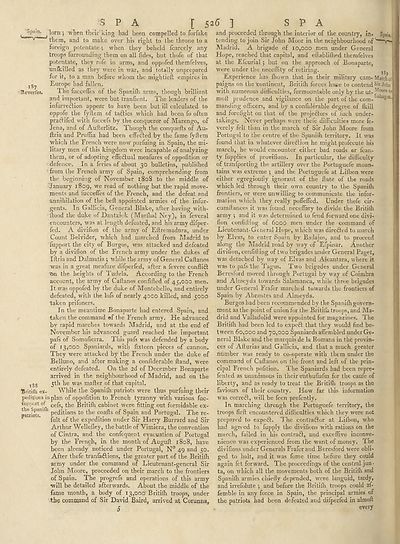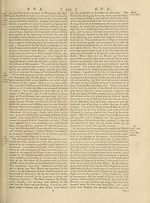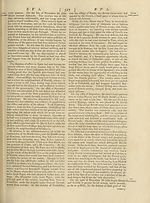Encyclopaedia Britannica, or, a Dictionary of arts, sciences, and miscellaneous literature : enlarged and improved. Illustrated with nearly six hundred engravings > Volume 19, Scripture-SUG
(574) Page 526
Download files
Complete book:
Individual page:
Thumbnail gallery: Grid view | List view

s. PA Is
, ^Pa^n- lorn 3 wlten their king had been compelled to forfoke
4 them, and to make over his right to the throne to a
foreign potentate \ when they beheld fcarcely any
troops furrounding them on all fides, but thofe of that
potentate, they rofe in arms, and oppofed themfelves,
unfkilled as they were in war, and totally unprepared
for it, to a man before whom the mightieft empires in
Europe had fallen.
5everfes. The fucceffes of the Spanifli arms, though brilliant
and important, were but tranlient. The leaders of the
infurreftion appear to have been but ill calculated to
oppofe the fyftem of tallies which had been fo often
praftifed with fuccefs by the conqueror of Marengo, of
Jena, and of Aufteriitz. Though the conquefts of Au-
ftria and Pruflia had been effected by the fame fyftem
which the French were now purfuing in Spain, the mi¬
litary men of this kingdom were incapable of analyzing
them, or of adopting effectual meafures of oppofition or
defence. In a feries of about 30 bulletins, publilhed
from the French army of Spain, comprehending from
the beginning of November 1808 to the middle of
January 1809, we read of nothing but the rapid move¬
ments and fucceffes of the French, and the defeat and
annihilation of the beft appointed armies of the infur-
gents. In Gallicia, General Blake, after having with-
ffood the duke of Dantzick (Marihal Ney), in feveral
encounters, was at length defeated, and his army difper-
fed. A divifion of the army of Eftremadura, under
Count Belvider, which had marched from Madrid to
fupport the city of Burgos, was attacked and defeated
by a divifion of the French army under the dukes of
Iftria and Dalmatia ; while the army of Genei-al Caftanos
was in a great meafure difperfed, after a fevere conflidl:
'On the heights of Tudela. According to the French
account, the army of Caftanos confifted of 45,000 men.
It was oppofed by the duke of Montebello, and entirely
defeated, with the lofs of nearly 4000 killed, and 5000
taken prifoners.
In the meantime Bonaparte had entered Spain, and
taken the command of the French army. He advanced
by rapid marches towards Madrid, and at the end of
November his advanced guard reached the important
pafs of Somofierra. This pahs was defended by a body
of 13,000 Spaniards, with fixteen pieces of cannon.
They were attacked by the French under the duke of
Belluno, and after making a confiderable ftand, were
entirely defeated. On the 2d of December Bonaparte
arrived in the neighbourhood of Madrid, and on the
tSS 5th he was mafter of that capital.
ex- While the Spanifli patriots were thus purfuing their
peditions in plan of oppofition to French tyranny with various fuc-
fui'port of cef^ Britifh cabinet were fitting out formidable ex-
Batriots"1 ' petitions to the coafts of Spain and Portugal. The re-
fult of the expedition under Sir Harry Burrard and Sir
Arthur Wellefley, the battle of Vimiera, the convention
of Cintra, and the confequent evacuation of Portugal
by the French, in the month o^ Auguft 1808, have
been already noticed under Portugal, N° 49 and 50.
After thefe tranfaflions, the greater part of the Britifti
army under the command of Lieutenant-general Sir
John Moore, proceeded on their march to the frontiers
of Spain. The progrefs and operations of this army
will be detailed afterwards. About the middle of the
fame month, a body of 13,000 Britifti troops, under
the command of Sir David Baird, arrived at Corunna,
5
6 ] SPA
and proceeded through the interior of the country, in- Spain,,
tending to join Sir John Moor in the neighbourhood of'■““V'*
Madrid. A brigade of 10,000 men under General
Hope, reached that capital, and eftabliftied themfelves
at the Eieurial ; but on the approach of Bonaparte,
were under the neceftity of retiring. |
Experience has ftiown that in their military cam-Match oil
paigns on the "continent, Britifti forces ha^e to contend sir John 1
with numerous difficulties, furmountable only by the ut-^00ret:cI
molt prudence and vigilance on the part of the com-ua‘
manding officers, and by a confiderable degree of fldll
and forefight on that of the projectors of fuch under¬
takings. Never perhaps were thefe difficulties more fe-
verely felt than in the march of Sir John Moore from
Portugal to the centre of the Spanifti territory. It was
found that in whatever direction he might profeeute his
march, he would encounter either bad roads er fcan-
ty fupplies of provllions. In particular, the difficulty
of tranfporting the artillery over the Portuguefe moun¬
tains was extreme 5 and the Portuguefe at Lifbon were
either egregioufly ignorant of the ftate of the roads
which led through their own country to the Spanifli
frontiers, or were unwilling to communicate the infor¬
mation which they really poffeffed. Under thefe cir-
cumftances it was found neceffary to divide the Britifti
army ; and it was determined to fend forward one divi¬
fion confiding of 600O men under the command of
Lieutenant-General Hope, which u'as directed to march
by Elvas, to enter Spain by B.idajos, and to proceed
along the Madrid road by way of Efpinar. Another
divifion, confifting of tvTo brigades under General Paget,
was detached by way of Elvas and Alcantara, where it
ivas to pafs the Tagus. Two brigades under General
Beresford moved through Portugal by way of Coimbra
and Almeyda towards Salamanca, while three brigades
under General Frafer marched towards the frontiers of
Spain by Abrantes and Alroeyda.
Burgos had been recommended by the Spanifti govern¬
ment as the point of union for the Britifti troops, and Ma¬
drid and Valladolid were appointed for magazines. The
Britifti had been led to expert that they ivould find be-
tiveen 60,000 and 70,000 Spaniards affembled under Ge¬
neral Blake and the marquis de la Romana in the provin¬
ces of Afturias and Gallicia, and that a much greater
number ivas ready to co-operate with them under the
command of Caftanos on the front and left of the prin¬
cipal French pofition. The Spaniards had been repre-
fented as unanimous in their etithufiafm for the caufe of
liberty, and as ready to treat the Britifti troops as the
faviours of their country. How far this information
was correft, will be feen prefently.
In marching through the Portuguefe territory, the
troops firft encountered difficulties which they were not
prepared to expert. The contractor at Liibon, who
had agreed to fupply the divifions with rations on the
march, failed in his contract, and exceflive inconve¬
nience vras experienced from the want of money. The
divifions under Generals Frafer and Beresford were obli¬
ged to halt, and it was fome time before they could
again fet forward. The proceedings of the central jun-
ta, on which all the movements both of the Britifti and
Spanifli armies chiefly depended, were languid, tardy,
and irrefolute ; and before the Britifti troops could af-
femble in any force in Spain, the principal armies of
the patriots had been defeated and difperfed in almoft
every
, ^Pa^n- lorn 3 wlten their king had been compelled to forfoke
4 them, and to make over his right to the throne to a
foreign potentate \ when they beheld fcarcely any
troops furrounding them on all fides, but thofe of that
potentate, they rofe in arms, and oppofed themfelves,
unfkilled as they were in war, and totally unprepared
for it, to a man before whom the mightieft empires in
Europe had fallen.
5everfes. The fucceffes of the Spanifli arms, though brilliant
and important, were but tranlient. The leaders of the
infurreftion appear to have been but ill calculated to
oppofe the fyftem of tallies which had been fo often
praftifed with fuccefs by the conqueror of Marengo, of
Jena, and of Aufteriitz. Though the conquefts of Au-
ftria and Pruflia had been effected by the fame fyftem
which the French were now purfuing in Spain, the mi¬
litary men of this kingdom were incapable of analyzing
them, or of adopting effectual meafures of oppofition or
defence. In a feries of about 30 bulletins, publilhed
from the French army of Spain, comprehending from
the beginning of November 1808 to the middle of
January 1809, we read of nothing but the rapid move¬
ments and fucceffes of the French, and the defeat and
annihilation of the beft appointed armies of the infur-
gents. In Gallicia, General Blake, after having with-
ffood the duke of Dantzick (Marihal Ney), in feveral
encounters, was at length defeated, and his army difper-
fed. A divifion of the army of Eftremadura, under
Count Belvider, which had marched from Madrid to
fupport the city of Burgos, was attacked and defeated
by a divifion of the French army under the dukes of
Iftria and Dalmatia ; while the army of Genei-al Caftanos
was in a great meafure difperfed, after a fevere conflidl:
'On the heights of Tudela. According to the French
account, the army of Caftanos confifted of 45,000 men.
It was oppofed by the duke of Montebello, and entirely
defeated, with the lofs of nearly 4000 killed, and 5000
taken prifoners.
In the meantime Bonaparte had entered Spain, and
taken the command of the French army. He advanced
by rapid marches towards Madrid, and at the end of
November his advanced guard reached the important
pafs of Somofierra. This pahs was defended by a body
of 13,000 Spaniards, with fixteen pieces of cannon.
They were attacked by the French under the duke of
Belluno, and after making a confiderable ftand, were
entirely defeated. On the 2d of December Bonaparte
arrived in the neighbourhood of Madrid, and on the
tSS 5th he was mafter of that capital.
ex- While the Spanifli patriots were thus purfuing their
peditions in plan of oppofition to French tyranny with various fuc-
fui'port of cef^ Britifh cabinet were fitting out formidable ex-
Batriots"1 ' petitions to the coafts of Spain and Portugal. The re-
fult of the expedition under Sir Harry Burrard and Sir
Arthur Wellefley, the battle of Vimiera, the convention
of Cintra, and the confequent evacuation of Portugal
by the French, in the month o^ Auguft 1808, have
been already noticed under Portugal, N° 49 and 50.
After thefe tranfaflions, the greater part of the Britifti
army under the command of Lieutenant-general Sir
John Moore, proceeded on their march to the frontiers
of Spain. The progrefs and operations of this army
will be detailed afterwards. About the middle of the
fame month, a body of 13,000 Britifti troops, under
the command of Sir David Baird, arrived at Corunna,
5
6 ] SPA
and proceeded through the interior of the country, in- Spain,,
tending to join Sir John Moor in the neighbourhood of'■““V'*
Madrid. A brigade of 10,000 men under General
Hope, reached that capital, and eftabliftied themfelves
at the Eieurial ; but on the approach of Bonaparte,
were under the neceftity of retiring. |
Experience has ftiown that in their military cam-Match oil
paigns on the "continent, Britifti forces ha^e to contend sir John 1
with numerous difficulties, furmountable only by the ut-^00ret:cI
molt prudence and vigilance on the part of the com-ua‘
manding officers, and by a confiderable degree of fldll
and forefight on that of the projectors of fuch under¬
takings. Never perhaps were thefe difficulties more fe-
verely felt than in the march of Sir John Moore from
Portugal to the centre of the Spanifti territory. It was
found that in whatever direction he might profeeute his
march, he would encounter either bad roads er fcan-
ty fupplies of provllions. In particular, the difficulty
of tranfporting the artillery over the Portuguefe moun¬
tains was extreme 5 and the Portuguefe at Lifbon were
either egregioufly ignorant of the ftate of the roads
which led through their own country to the Spanifli
frontiers, or were unwilling to communicate the infor¬
mation which they really poffeffed. Under thefe cir-
cumftances it was found neceffary to divide the Britifti
army ; and it was determined to fend forward one divi¬
fion confiding of 600O men under the command of
Lieutenant-General Hope, which u'as directed to march
by Elvas, to enter Spain by B.idajos, and to proceed
along the Madrid road by way of Efpinar. Another
divifion, confifting of tvTo brigades under General Paget,
was detached by way of Elvas and Alcantara, where it
ivas to pafs the Tagus. Two brigades under General
Beresford moved through Portugal by way of Coimbra
and Almeyda towards Salamanca, while three brigades
under General Frafer marched towards the frontiers of
Spain by Abrantes and Alroeyda.
Burgos had been recommended by the Spanifti govern¬
ment as the point of union for the Britifti troops, and Ma¬
drid and Valladolid were appointed for magazines. The
Britifti had been led to expert that they ivould find be-
tiveen 60,000 and 70,000 Spaniards affembled under Ge¬
neral Blake and the marquis de la Romana in the provin¬
ces of Afturias and Gallicia, and that a much greater
number ivas ready to co-operate with them under the
command of Caftanos on the front and left of the prin¬
cipal French pofition. The Spaniards had been repre-
fented as unanimous in their etithufiafm for the caufe of
liberty, and as ready to treat the Britifti troops as the
faviours of their country. How far this information
was correft, will be feen prefently.
In marching through the Portuguefe territory, the
troops firft encountered difficulties which they were not
prepared to expert. The contractor at Liibon, who
had agreed to fupply the divifions with rations on the
march, failed in his contract, and exceflive inconve¬
nience vras experienced from the want of money. The
divifions under Generals Frafer and Beresford were obli¬
ged to halt, and it was fome time before they could
again fet forward. The proceedings of the central jun-
ta, on which all the movements both of the Britifti and
Spanifli armies chiefly depended, were languid, tardy,
and irrefolute ; and before the Britifti troops could af-
femble in any force in Spain, the principal armies of
the patriots had been defeated and difperfed in almoft
every
Set display mode to:
![]() Universal Viewer |
Universal Viewer | ![]() Mirador |
Large image | Transcription
Mirador |
Large image | Transcription
Images and transcriptions on this page, including medium image downloads, may be used under the Creative Commons Attribution 4.0 International Licence unless otherwise stated. ![]()
| Permanent URL | https://digital.nls.uk/192702744 |
|---|
| Attribution and copyright: |
|
|---|
| Description | Ten editions of 'Encyclopaedia Britannica', issued from 1768-1903, in 231 volumes. Originally issued in 100 weekly parts (3 volumes) between 1768 and 1771 by publishers: Colin Macfarquhar and Andrew Bell (Edinburgh); editor: William Smellie: engraver: Andrew Bell. Expanded editions in the 19th century featured more volumes and contributions from leading experts in their fields. Managed and published in Edinburgh up to the 9th edition (25 volumes, from 1875-1889); the 10th edition (1902-1903) re-issued the 9th edition, with 11 supplementary volumes. |
|---|---|
| Additional NLS resources: |
|

